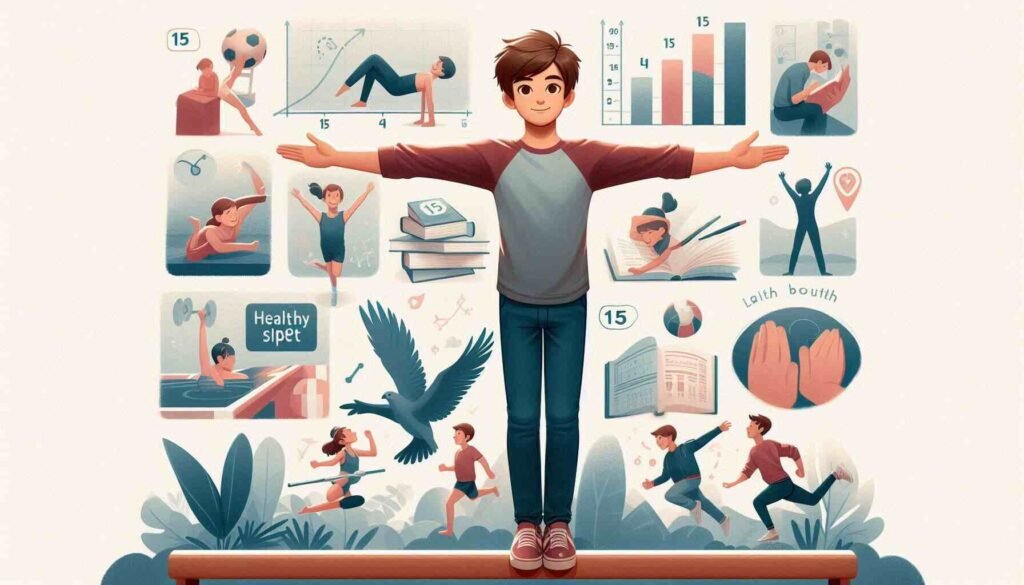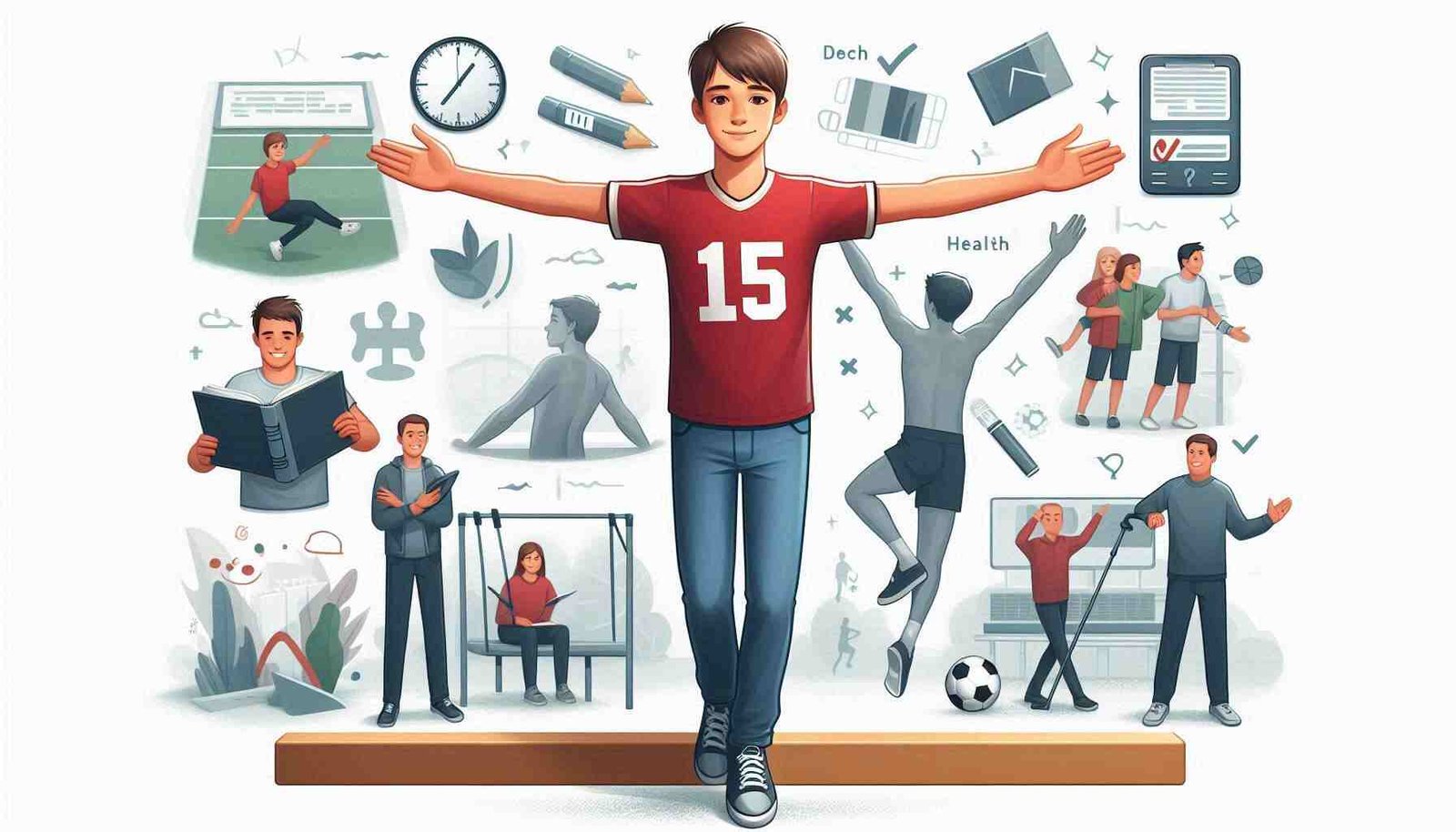Parents often ask if a 15-year-old is an adult. This question is complex. The teenage years mark a crucial time in a person’s life. During this period, young individuals go through vast changes. These changes include physical growth, new social interactions, different ways of thinking, and emotional growth. Understanding these aspects helps figure out when teenagers become true grown-ups. We will also look at how to best support our 15-year-olds.
Key Takeaways
- Adolescence is a critical transitional stage that encompasses the years between 10 and 24 years old.
- A 15-year-old is still experiencing significant physical, social, cognitive, and emotional changes associated with early and middle adolescence.
- While a 15-year-old may exhibit some signs of maturity, they have not yet reached full emotional, social, and cognitive development.
- Effective parenting during this period involves maintaining open communication, respecting their growing independence, and providing a supportive environment.
- Understanding the challenges of adolescence, such as mental health considerations, can help parents navigate this pivotal stage of development.
Understanding Adolescence
Adolescence is the time between 10 and 24 years old. It’s a key time for growth and change. In these years, people move from being kids to adults.
What is the Adolescent Age Range?
The word “adolescence” covers ages 10 to 24. This time is split into three parts: early (10-13), middle (14-17), and late (18-24).
Stages of Adolescence
Adolescence has stages with its own special changes. Early adolescence is from ages 10 to 13. This time sees puberty start and a wish for more freedom. Thinking also becomes more complex.
The middle and late stages bring more growth. This includes figuring out who you are, making friends, and solving problems better.
Developmental Milestones at 15
Being 15 means facing many big changes in physical, social, cognitive, and emotional areas. Parents and caregivers play a key role in helping teens through these times. Knowing about the 15-year-old stage can make a big difference in their support and understanding.
Physical Development
At 15, many girls have started puberty. This leads to changes like growing breasts and starting periods. It’s common for them to worry about how they look, like if they have acne or weight changes.
Creating loving surroundings and promoting good habits will boost their confidence during this time.
Social Development
15-year-olds want to be more independent and be accepted by friends. They might choose hanging out with friends over family. This change is part of growing up as they try to find themselves.
Parents can help by giving them more freedom but also staying connected. This means still spending quality time together and talking openly.
Cognitive Development
By age 15, teens are learning to think about things in a more complex way. But they might find it hard to use this new thinking in their own lives. Teaching them to think critically will make this stage smoother.
Emotional Development
15-year-olds might have big mood swings and start to be interested in dating. They also become more aware of right and wrong. This can be tough for teens and parents alike as they work through emotional challenges.
Creating a calm and supportive atmosphere is crucial. Parents should also guide them towards constructive ways of handling feelings.
Is a 15-Year-Old a Grown Up?
Teens are on a journey from child to adult. A 15-year-old can show signs of growing up. They may act more independently and have deeper thoughts. But they are still changing a lot in their teens.
The age when someone is legally an adult changes by where they live. For most, it’s between 18 and 21. This shows that becoming fully mature takes time, often until the early 20s. A 15-year-old can make some choices like an adult. Yet, they are still in their teenage journey.
This article looks at the challenges and big moments of being 15. It explains when a person really feels like an adult. Knowing what a 15-year-old goes through helps parents, teachers, and leaders. They can guide young people better. This support is key as they grow to be fully independent and mature.
Parenting a 15-Year-Old

When your teen turns 15, they’re in for a thrilling yet tough time. It’s important for you to use the right parenting strategies now. These strategies can make this phase easier for both of you. The second source has tips on helping your 15-year-old at this key stage.
Positive Parenting Tips
Open communication and showing respect for your teenager’s independence are crucial. Also, aim to create a consistent, supportive home. Let your teen chase their interests, cheer for their wins, and let them make some of their own choices. This shows them you trust their judgment but are still there to help.
Safety First
Keeping your teen safe is super important when they turn 15. Talk openly about the dangers of things like drugs or fast driving. It’s key to set clear rules and expectations together. This way, you can guide your 15-year-old through this phase with more caution.
Healthy Bodies
Encouraging healthy habits is a big part of parenting a 15-year-old. Make sure they sleep enough, eat well, and stay active. This boosts their health on many levels. It prepares them for smoothly moving into their adult years.
Use these positive parenting tips to support your 15-year-old through the challenges of adolescence. They help your teen grow and thrive during this important period.
Challenges of Adolescence
The teenage years can be tough. Adolescents and parents face a unique set of issues. For instance, 15-year-olds dealing with adolescence may have challenges related to mental health considerations.
It’s common for teens to face mood swings, depression, and anxiety. These issues often show up as they try to find their identity and independence. Parents should watch for mental health signs. If needed, they must be ready to get professional help for their child.
Mental Health Considerations
At 15, teens see many changes, including in their mind. They might develop anxiety, depression, or become very self-conscious. Parents need to be on the lookout for these issues. They should act fast to get help if they spot any problems.
Ways to Bond
Building a strong parent-teen bond is key during this period. It’s important to keep doing things together and to respect the teenager’s need for privacy. Also, spending quality time that suits their changing needs and interests helps a lot. It helps in creating a supportive environment for a 15-year-old’s growth and moving towards adulthood.
Conclusion
We’ve looked at what it means to be 15 in this article. At this age, one is not quite an adult yet. They are teenagers facing many changes. These changes happen in their mind, body, and social life. It’s a crucial moment moving from childhood to adulthood.
Parents and other adults around them play a big role. They can help the 15-year-old in many ways. Offering good advice and making sure they are safe is important. Promoting healthy choices also guides them as they move towards being grown ups. It’s all about finding a good balance between giving them freedom and support.
The big question is, are 15-year-olds really adults? The answer is not simple. It depends on the person. But by supporting teens and understanding their needs, we can help them succeed. This is a key time in their life. And we can make a difference by guiding them towards becoming successful adults.
FAQ
Is a 15-year-old considered a grown-up?
No, a 15-year-old isn’t seen as a grown-up. They are in the middle of growing up, not yet fully mature. This is a stage where they handle many changes—physically, mentally, and emotionally.
What are the different stages of adolescence?
Adolescence goes through three stages: early (10-13), middle (14-17), and late (18-24). Each phase brings its own set of challenges and growth experiences.
What are the typical developmental milestones for a 15-year-old?
By 15, most have gone through puberty. This often makes them aware of their looks. They also start wanting more freedom from parents while needing acceptance from friends.
Thinking-wise, they’re getting better at complex tasks. But sometimes, it’s hard to translate this to personal issues. They also have intense ups and downs emotionally. Plus, they begin showing interest in romance and develop a strong sense of right and wrong.
What are some effective parenting strategies for 15-year-olds?
Good parenting here means keeping the talks open, letting them grow independent, and still showing support.
Tips include supporting their hobbies, cheering for their wins, and letting them take charge wisely. Safety and health are key as well. Always aim to keep a loving, positive environment around them.
What are some of the unique challenges that adolescents, including 15-year-olds, may face?
Young people may battle with their mental well-being. This could spark mood shifts and feelings of sadness or stress. Figuring out who they are is also crucial at this time. It’s vital for parents to look after their mental health, offering help when the need arises.
Building a strong parent-child bond is crucial too. Keep doing things together, respect their personal space, and adjust your quality time to match their changing interests.





